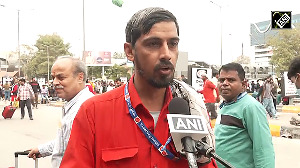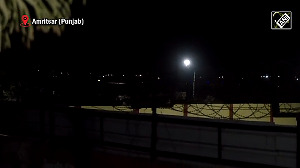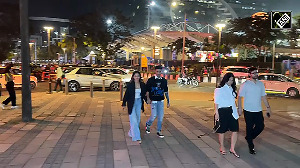In Bharat Borge's death by allegedly by suicide, the world has missed the wood for the trees.
To me, how Borge died -- under a train when pushed, fell, tripped, et cetera -- is incidental.
Taking his suicide note as significant enough for comment -- I think -- is not as relevant as why he died. I am sad to be saying that, but let us go by his words. There are good, larger issues involved.
Borge, who is described as the crucial witness in the alleged attempt at sabotage of business baron Anil Ambani's helicopter, left a note in which he made a crucial revelation. That he wanted to tell the police 'about this' -- the alleged contact made by Reliance officials, 'but got scared after seeing an accused being beaten up.'
Rarely has such a confession been left behind in what amounts to a virtual dying declaration by a man who appears quite the prototype common man. It is something that ought to be taken seriously enough.
But we don't. Being beaten up in police custody is more common than being killed by police in what they call encounters which are almost invariably staged. And policing, we are told, is always like that. It ought not to be.
That fear is what we, as claims to be a part of the civilised world, need to take note of. That is a common man's biggest crisis when dealing with the police and policemen.
Fear, to me, is the key to their touted success, if any real successes can be attributed to them. That fear is what we can do without.
Often I wonder, what would happen should the policemen with the baton or other instruments of torture were to meet a man who had no fear? That would be the day.
Imagine a scenario what that fear could have done to Borge if he had not committed suicide. Let me speculate, though I do not imply that Borge would have done that really, but the scope does exist, on the various possibilities.
For one, a nice round of beating could have extracted a confession from him that he had sabotaged the helicopter. That would have been notched up as a success in police records. That 'solved' case, in turn, could have left the real culprit/s scot-free, scoffing at the police ineptitude.
For another, fear could have also driven Borge to 'confess' to the police to fix a person they already have on their minds as a convenient fall guy. That too would have solved a case for the record but would have got an innocent behind bars and left the guilty free.
Why, the police, if they chose to, could have just about given the case any direction of their convenience.
That, more often than not, is what always happens across the country. That makes the police the most powerful as predators but weakens the criminal justice system.
But are we as a nation doing anything about it?
Scarcely anything, if you ask me. In fact, that means of investigation, of using the stick and not a probe using methodical questioning, forensic aides, piecing together the evidence. It may not be as romantic as the work done by the private detectives in a Perry Mason book or sheer deduction by Hercule Poirot or Sherlock Holmes. But it calls for hard work, patience and intelligence.
Here, the reference is to two kinds of intelligence. One is the kind which a set of useful, relevant information - Intelligence. The other is the mental faculties which helps put the facts together, find a pattern and draw the conclusions which can stand the test of the cleverest of defence lawyers.
But for that, a change in the mindsets of the administration and individuals at all levels is required but that is easier sought than found.
At least now, let us hope that at least this one death makes the system wake up and usher in concerted changes so that the police earns everyone's respect for their professionalism and gets help in cracking cases. Not fear which is counterproductive.
It is a fact that in more evolved societies, mostly in the West, policing is not the resort of the scoundrels but of dedicated professionals who take their tasks seriously. A single videograph or a photograph of police brutality is enough to rouse indignation and secure correctives including punishment for the erring policemen.
India needs that kind of policing and if we take Bharat Bhorge seriously, things may change.
However, I am sceptical. Things don't happen that way in India. No, they don't.
Mahesh Vijapurkar is a former deputy editor of The Hindu.






 © 2025
© 2025